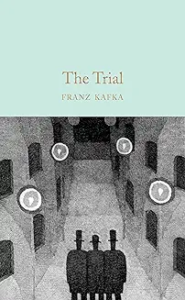The Trial by Franz Kafka 1925
Franz Kafka was a German speaking, Jewish Czech. He was nearly unknown in his lifetime, but his work was published after his death despite his request that it all be destroyed. Max Brod’s refusal to burn the notebooks, drafts, and other writings after Kafka’s death at age 40 of tuberculosis, has made Kafka one of the 20th C’s most famous and influential writers. The term “Kafkaesque” has entered the popular lexicon and refers to the kind of situation that “The Trial” describes, an innocent, innocuous person trapped in a surreal situation facing a faceless and indecipherable bureaucracy.
The book was completed and published posthumously by Brod in 1925 the year after Kafka’s death. It was listed by Le Monde as one of the 100 most important books of the 20th C and #2 of the Best German Novels of the 20th C.
The story begins with Joseph K waking up as usual in his rooming house, but instead of his landlady bringing him coffee and breakfast, he is confronted by two men who inform him that he is under arrest. We learn little about K though as the book unfolds it becomes clear he is an assessor at a Bank, 30 years old, and without family except for an uncle. The novel gradually and sometimes agonizingly slowly proceeds with ever more surreal and incredible scenes as K struggles to understand the bureaucracy and court system that has ensnared him. Everywhere he looks he finds courts and individuals who appear to have some influence on his case, and he is torn between the existential poles of vigorously active intervention versus passive waiting and seeing. The book ends rather strangely on K’s 31st birthday when two men in frock coats appear at his door and escort him to the countryside where they murder him. Really???
Kafka’s book was one of the three books chosen by the Boston Public Library for a contest for ‘best book’ of 1925 earlier this year. Three local authors each championed one book. The other two were “Mrs. Dalloway” and “The Great Gatsby”. Kafka’s book was supported by my favorite Harvard professor, James Wood, but he came up short as Virginia Woolf’s novel took the prize!
In summary, this posthumously published novel which was incomplete at the time of Kafka’s death is one of the 20th C’s most influential books and relevant for this moment in our nation as so many individuals face an uncaring and increasingly violent government. A classic.



